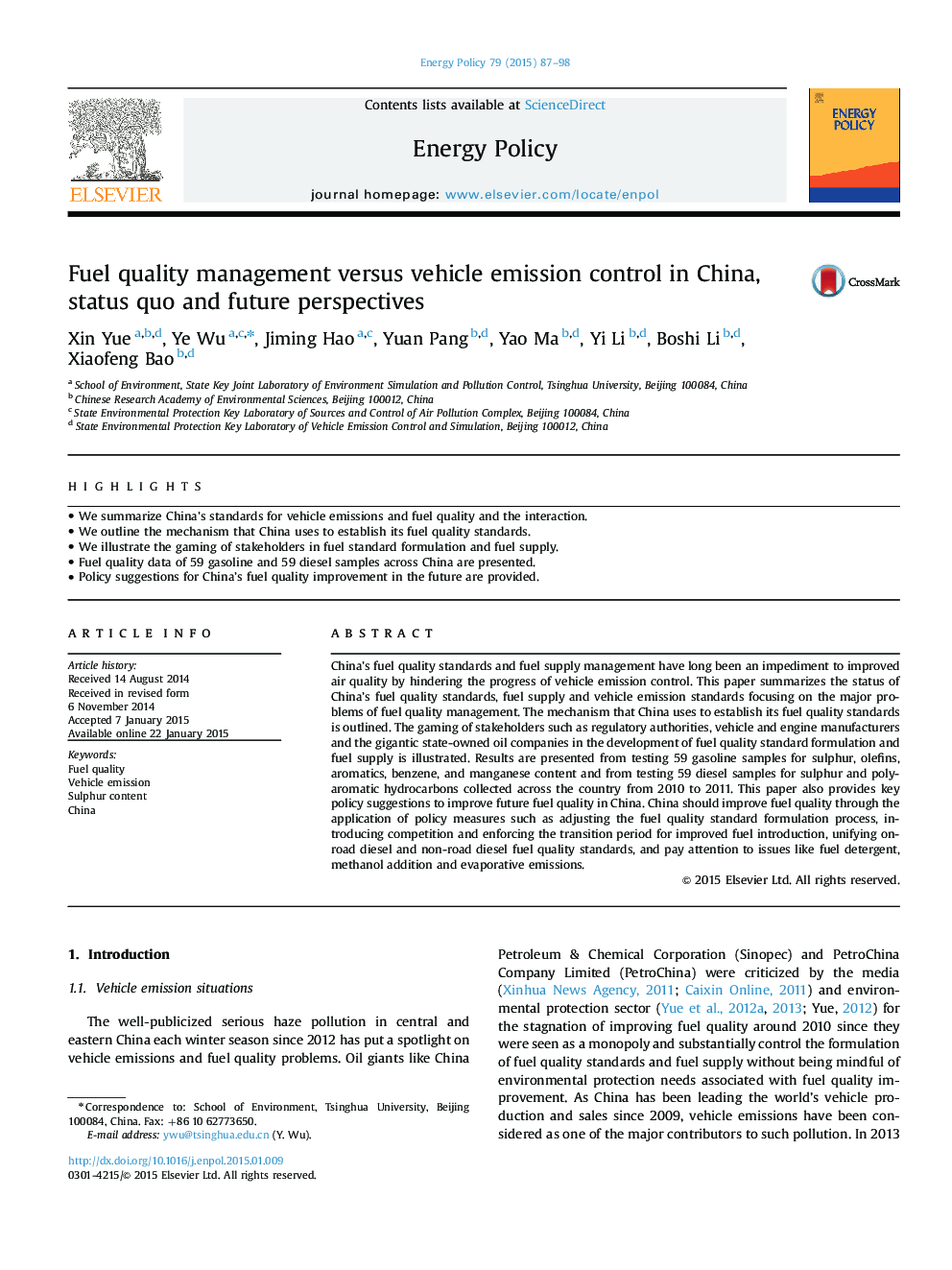| کد مقاله | کد نشریه | سال انتشار | مقاله انگلیسی | نسخه تمام متن |
|---|---|---|---|---|
| 7401142 | 1481279 | 2015 | 12 صفحه PDF | دانلود رایگان |
عنوان انگلیسی مقاله ISI
Fuel quality management versus vehicle emission control in China, status quo and future perspectives
ترجمه فارسی عنوان
مدیریت کیفیت سوخت در مقابل کنترل انتشار خودرو در چین، وضعیت موجود و دیدگاه های آینده
دانلود مقاله + سفارش ترجمه
دانلود مقاله ISI انگلیسی
رایگان برای ایرانیان
کلمات کلیدی
کیفیت سوخت، انتشار خودرو، محتوای گوگرد، چین،
ترجمه چکیده
استانداردهای کیفیت سوخت در چین و مدیریت عرضه سوخت به مدت طولانی مانع پیشرفت کنترل انتشار خودرو شده است. این مقاله خلاصه وضعیت استانداردهای سوخت چین، سوخت رسانی و استانداردهای انتشار خودرو است که با توجه به مشکلات عمده مدیریت کیفیت سوخت، خلاصه شده است. مکانیسم مورد استفاده چین برای ایجاد استانداردهای کیفیت سوخت خود مشخص شده است. بازی ذینفعان نظیر مقامات نظارتی، سازندگان وسایل نقلیه و موتور و شرکت های نفتی غول پیکر دولتی در توسعه استانداردهای استاندارد کیفیت سوخت و تامین سوخت نشان داده شده است. نتایج حاصل از آزمایش 59 نمونه بنزین برای گوگرد، الکل، آروماتیک، بنزن و منگنز و آزمایش 59 نمونه دیزلی برای هیدروکربن های سولفور و پلیاروماتیک در سراسر کشور از سال 2010 تا 2011 ارائه شده است. این مقاله همچنین پیشنهادات کلیدی سیاست را برای بهبود آینده ارائه می دهد. کیفیت سوخت در چین. چین باید از طریق استفاده از اقدامات سیاستی مانند تنظیم فرایند فرمول بندی استاندارد کیفیت سوخت، معرفی رقابت و اجرای دوره انتقال برای بهبود وضعیت سوخت، اصلاح استانداردهای کیفیت سوخت دیزل و غیر دیزلی در جاده ها و توجه به کیفیت سوخت را بهبود بخشد. به مسائل مانند پاک کننده مواد سوخت، افزودن متانول و انتشار تبخیری.
موضوعات مرتبط
مهندسی و علوم پایه
مهندسی انرژی
مهندسی انرژی و فناوری های برق
چکیده انگلیسی
China's fuel quality standards and fuel supply management have long been an impediment to improved air quality by hindering the progress of vehicle emission control. This paper summarizes the status of China's fuel quality standards, fuel supply and vehicle emission standards focusing on the major problems of fuel quality management. The mechanism that China uses to establish its fuel quality standards is outlined. The gaming of stakeholders such as regulatory authorities, vehicle and engine manufacturers and the gigantic state-owned oil companies in the development of fuel quality standard formulation and fuel supply is illustrated. Results are presented from testing 59 gasoline samples for sulphur, olefins, aromatics, benzene, and manganese content and from testing 59 diesel samples for sulphur and polyaromatic hydrocarbons collected across the country from 2010 to 2011. This paper also provides key policy suggestions to improve future fuel quality in China. China should improve fuel quality through the application of policy measures such as adjusting the fuel quality standard formulation process, introducing competition and enforcing the transition period for improved fuel introduction, unifying on-road diesel and non-road diesel fuel quality standards, and pay attention to issues like fuel detergent, methanol addition and evaporative emissions.
ناشر
Database: Elsevier - ScienceDirect (ساینس دایرکت)
Journal: Energy Policy - Volume 79, April 2015, Pages 87-98
Journal: Energy Policy - Volume 79, April 2015, Pages 87-98
نویسندگان
Xin Yue, Ye Wu, Jiming Hao, Yuan Pang, Yao Ma, Yi Li, Boshi Li, Xiaofeng Bao,
